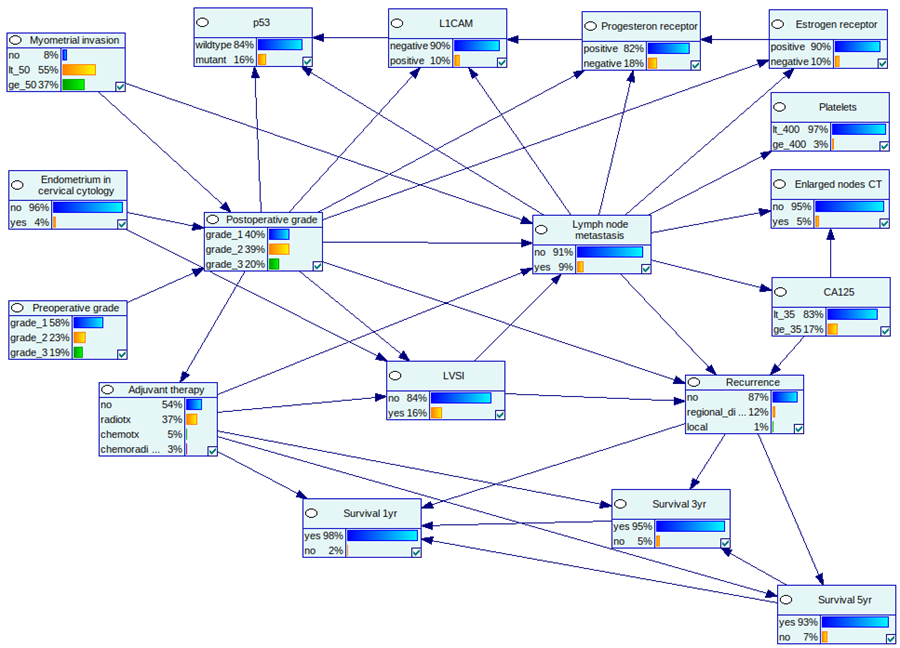Cancer of the mucous lining of the womb, formally known as endometrial carcinoma, is the most common gynecological malignancy with rising incidence due to increased life expectancy and obesity.
Based on particular clinical and laboratory findings, a gynecologist establishes the prognosis of the condition and determines the optimal treatment based on that. Usually, the treatment starts with the surgical removal of the womb and the ovaries. This is followed by chemotherapy and radiotherapy, based on expectations of the future development of cancer. In particular relevant in this context is the presence of affected lymph nodes in the abdomen. Whether or not patients benefit from extensive treatment or mainly suffer from treatment-related toxicity is highly relevant for the patients, who are often elderly, fragile, and medically unfit. As no one is very good at predicting future development, our researchers supervised by DMB member Peter Lucas, have developed a computer program that includes a probabilistic network model, shown in Figure 1, that has been learned, using machine learning, from extensive datasets of patient data. Data came from clinical centers collaborating with the European Network for Individual Treatment in Endometrial Cancer (ENITEC). The network model, called the ENDORISK model, supports gynecologists and patients in making treatment decisions in a way that resembles clinical reasoning.

Fig 1: ENDORISK probabilistic network model consisting of 18 variables (boxes with bar graphs) and arrows showing the causal dependencies between the variables. The bar graphs show the local probability distributions of the variables, based on the probability distribution of all variables together. The model can be used to predict the presence of lymph node metastasis and survival after entering an individual patient's data, which determines the prognosis.
The model was constructed by integrating clinical, histological, and immunohistochemical biomarkers using machine learning, resulting in a superior prognostic accuracy for estimated risk compared to current stratification based on tumor grade only. The model has been validated by clinicians in Tübingen, Germany, and Brno, Czech Republic, resulting in a similar performance, illustrating the consistent performance of the ENDORISK-model. It is currently being extended and provided as a web-based tool to the healthcare community.
For more information, please contact:
References
C. Reijnen, E. Gogou, …, P.J.F. Lucas, J.M.A. Pijnenborg. Preoperative risk stratification in endometrial cancer (ENDORISK) by a Bayesian network model: A development and validation study, PLOS Medicine; 17 (5), pp. E1003111, 2020, DOI 10.1371/journal.pmed.
M. Grube, C. Reijnen, P.J.F. Lucas, F. Kommoss, F.K.F. Kommoss, S.Y. Brucker, et al. Improved preoperative risk stratification in endometrial carcinoma patients: external validation of the ENDORISK Bayesian network model in a large population-based case series. Journal of Cancer Research and Clinical Oncology (Springer), 1-9, 2022, DOI 10.1007/s00432-022-04218-4.
P Vinklerova, P Ovesna, J Hausnerova, J Pijnenborg, PJF Lucas, et al. External Validation Study of Endometrial Cancer Preoperative Risk Stratification (ENDORISK) Model. Frontiers in oncology, 3895, 2022, DOI 10.3389/fonc.2022.939226.






